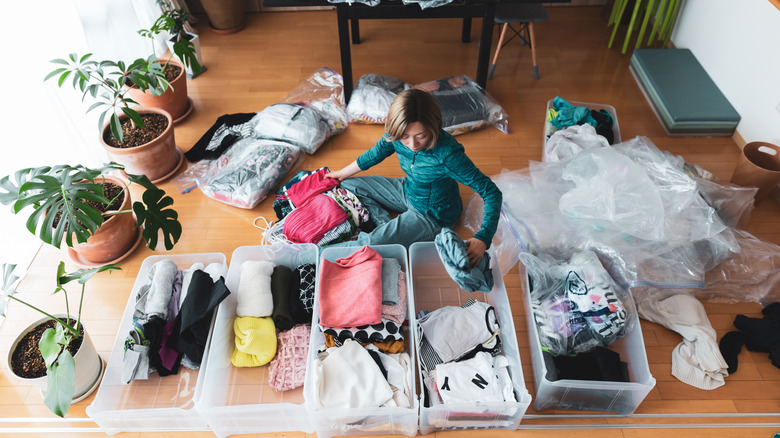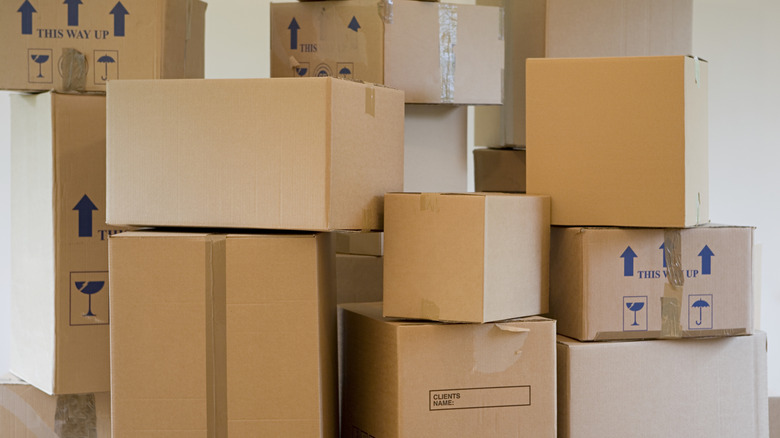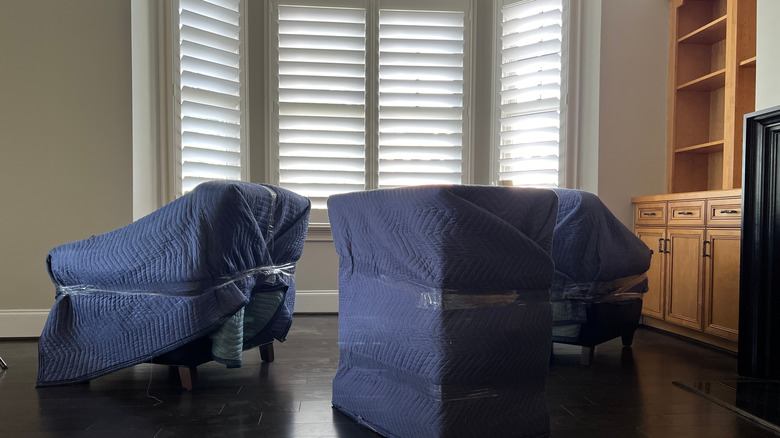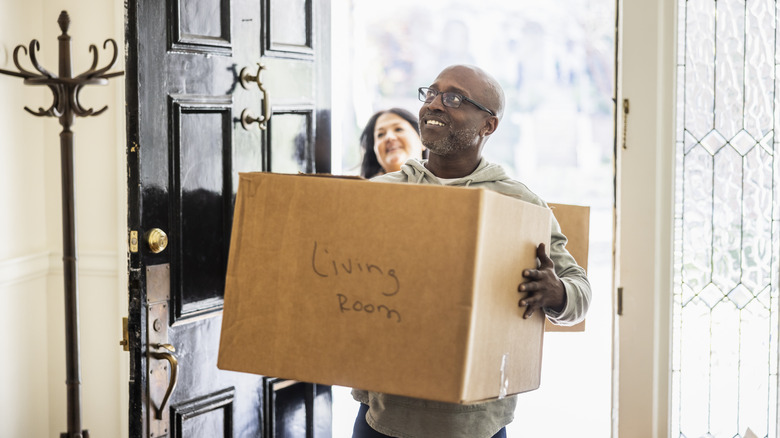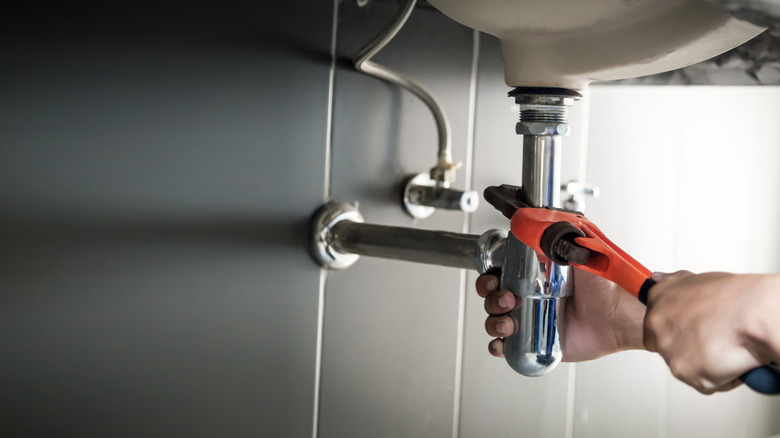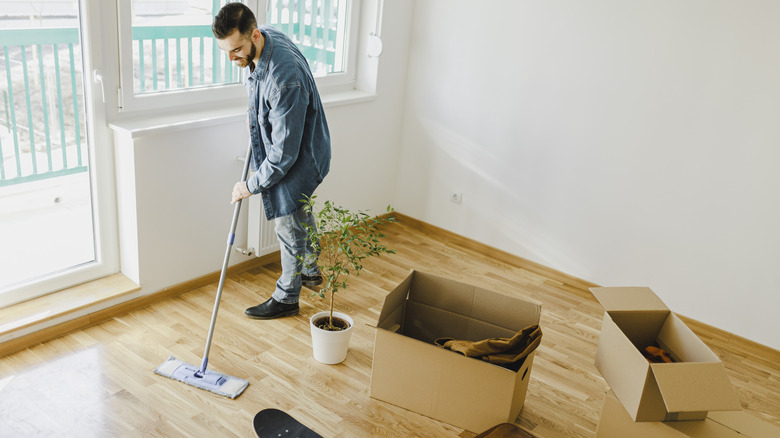The Essential Moving Checklist To Prepare Your Home
We may receive a commission on purchases made from links.
Did you know that the average person in the United States moves nearly 12 times during their lifetime? Although moving can be a very exciting experience, it can also be very overwhelming — and that's true whether you're moving across the street or across the country. After all, organizing, packing, and moving everything you own isn't exactly fun, especially if you have a lot of things and/or have a large family. Plus, there are a lot of logistics to sort through, and the idea of having to start over in a new space can be a little intimidating. So, we have compiled an essential checklist to get you ready for your move.
A checklist can be key to helping you prepare for a move. When you have lots of logistics to prepare for and remember, keeping details organized helps you keep the process as smooth and stress-free as possible. Follow these guidelines, and you will be well on your way to your new home and all the excitement that comes with it.
Start paring down unnecessary belongings 8 weeks before your move
One of the best ways to make your move a little less stressful is to start sorting through your belongings and getting rid of anything you no longer need. According to experts, you should start this process about eight weeks before your move date. While there may be some items you choose to throw away, you can also consider donating clothing and other personal items that are still in good condition. If you prefer not to donate to thrift stores due to their alleged controversies, there are plenty of alternatives to thrift store donations, such as donating to area shelters or foster care facilities.
Taking the time to get rid of things can help expedite the moving process because you won't have to worry about sorting and packing at the same time. Even better, you won't have to go through the hassle of moving things you don't want to keep and then trying to get rid of them afterward.
Decide if you want to hire movers 4 weeks before your move
Arguably, one of the most important decisions you'll make surrounding your move is whether or not you want to hire professional movers or do the heavy lifting yourself. If you do decide to tackle the move without professional help, you may want to consider renting a moving truck. Companies such as U-Haul offer prices starting as low as $19.95, with an additional charge for mileage. While the DIY option may be more cost-effective, it can also be more physically challenging, especially if you're unable to bribe friends and/or family with free pizza in exchange for their help. On the other hand, professional movers typically cost around $1,700 on average, depending on the size of your home and the distance of your move. If you do opt to hire professional movers, experts suggest booking at least four weeks ahead of your move.
If neither of those options appeals to you, you can also consider renting a moving container. Not only does this option give you more flexibility in terms of scheduling your move, but it's also less expensive than a professional moving company. These containers generally cost less than $600 for local moves. The container is delivered to your home, where you fill it and then have it picked up and transported to your new city. Ultimately, the decision to DIY it or hire the pros depends largely on how much you have to move and how far your current home is from your new one.
Purchase moving supplies 4 to 6 weeks before the move
When you're moving your beloved belongings, the last thing you want to deal with is breaking or damaging something. Fortunately, purchasing the right moving supplies can help keep all of your things safe during the move. Experts suggest getting your supplies four to six weeks before moving. You're probably already aware that you'll need boxes, but you should also consider buying additional supplies, such as bubble wrap to protect fragile items, tape, markers, and mattress bags.
The price of moving boxes can range from under $2 to more than $20, depending on size and quality. This can quickly add up depending on the number of boxes you might need. If you're trying to save a few dollars, you can look for free boxes on platforms such as Facebook Marketplace, Nextdoor, or OfferUp. You may also be able to find other free or heavily discounted moving supplies using these outlets. You can also go to your local grocery store and ask for egg boxes, which are cardboard boxes with handles, making it easier to move your things. However, if you would rather get all of your packing material in one go, you can also find relatively affordable deals. For instance, a 10-pack of Box USA's Medium Cardboard Boxes is $19, and you can store all of your clothes in Cryster's Extra Large Totes, which are giant bags with handles that will make hauling your wardrobe a breeze.
Get the proper protection for large appliances and furniture 1 week before the big day
Moving day can be tough on your home's interior. On top of increased foot traffic, there's a chance that furniture, appliances, and other heavy items could potentially scratch or dent your walls and floors as they're being moved in and out of your home. In order to minimize the chances of this happening, experts recommend using a dolly with rubber wheels, which makes it easier to move boxes and other heavy items without the risk of someone accidentally dropping them. Such an example is Lifetime Appliance Part's Foldable Push Cart Dolly.
In addition, you should measure your large items and your doorways to ensure there's enough room for things to pass through without nicking or scratching your door frames. It's also a good idea to use blankets or bubble wrap to cover the legs of your furniture to keep them from scratching the floor as you move. If you're trying to stay budget-friendly, you can even use things you already have in your home to protect your floors. Rugs, sheets, and pieces of cardboard can be laid down to cover floors as items are being moved. It's a good idea to gather these materials a week before your move, giving you plenty of time to order supplies if you need to.
Organize and label boxes by room as you pack
One way to cut down on chaos during your move is to keep all of your boxes organized. Moving aficionados suggest doing this by properly labeling all of your boxes with what's inside and which room they belong in. This will allow you (or your movers) to know exactly which room each box belongs in when bringing them into your new home.
There are some additional labeling tricks you can utilize to keep everything in order while moving. For example, write on multiple sides of the boxes so you can easily see what's in them, no matter how they end up arranged in your new home. If you want to make things even easier, you can also color-code your boxes so you know where they belong without having to read each of the labels. You can use something like TownStix's Large Colored Moving Stickers to do so. Pro tip: If you hire professional movers, it's also recommended that you write your last name on your boxes to lessen the likelihood of them getting lost or mixed up during the move.
Make arrangements for pets and/or kids 3 weeks ahead of time
Moving can be especially overwhelming for pets and small children. Not only are their routines being disrupted, but they're having to adjust to saying goodbye to one home and hello to another. As a result, you'll want to make sure they're as prepared as possible. One way to do this is to ask a loved one (or hire a sitter) to watch them during the move. It's best to do so 4 to 3 weeks ahead of time to ensure their schedule is open. If you're making a long-distance move, you should take some longer drives with your kid(s) and/or pet so they can get a feel for what it'll be like to be in the car for a long period of time. Another great tip for moving with a pet is to get your fur baby a thorough check-up at the vet, to make sure they are in good health and to prescribe calming medications if necessary.
Taking these steps will help you spend your moving day focused on the task at hand so you can get everything moved out and set up so your kid(s) and pet(s) can come back to a comfortable new space. It also provides your child or your furry loved one with a safe, quiet space while your home is a bit chaotic.
Transfer utilities 2 weeks ahead of time
Whether you're moving to and from a rental or buying and selling a home, transferring your utilities is a must. To ensure the process goes smoothly, you'll want to start by noting your current utilities and the names and contact information of your providers. Next, you'll want to research which utility companies provide service in the area you're moving to. Depending on how far you're moving, you might be working with completely different service providers, in which case you'll have to set up new accounts as opposed to transferring your existing ones. If you're moving to an HOA community, you should talk to the board to determine if there are any utilities included in your HOA fees. This may save you the hassle of sourcing providers on your own.
So, when should you transfer your utilities? Ideally, you'll have the utilities at your current home disconnected one day after your move, and you'll have the utilities in your new home turned on one day before you move. But scheduling at least two weeks ahead can help you stay on track with services you may need professionally installed.
Set up mail forwarding 10 days before your move
If you want to make sure your mail doesn't get lost in the shuffle of your move, signing up for mail forwarding is a must. You can do so by visiting your local post office or going to the United States Postal Service's website and filling out the change of address form seven to 10 days before your move. You'll have to pay a $1.10 fee to verify your identity, but the mail forwarding itself is free of charge. Once you've set it up, the post office will send anything addressed to you at your old address to your new one for 12 months.
On top of making sure your mail gets to your new home, mail forwarding also comes with coupons and other discounts. If you don't set up mail forwarding, any mail accumulated at your old address will be held at your local post office for 10 days. After that, the items will be returned to sender.
Schedule (or make) any necessary repairs to your rental 1 week prior to moving
If you're a renter, getting repairs taken care of is crucial if you want to keep your security deposit. Make a list of any needed fixes and review your lease to confirm what you're responsible for vs. what your landlord needs to repair. If you need to contact your landlord for any services, you should schedule them as soon as possible to ensure things are fixed before you move out; otherwise, there's a chance your security deposit could be at risk.
The most effective way to be sure everything is in good running order before your lease ends, is to schedule a walk-through with your landlord approximately one week before you leave. This way, you can demonstrate the good working order of the property or highlight any important outstanding repairs. Unfortunately, whether or not a walk-through will be possible is up to your landlord. Documenting the condition of the rental with photographs is another option in case you need to refer back to the condition in which you left the unit.
Be prepared to clean (before and after your move)
Cleaning is one of the most important parts of every move. Whether you own or rent, you want to leave your old home as clean as possible. Once everything has been removed from the home, the wiping can begin. Cleaning pros note that you should start cleaning from top to bottom, meaning beginning with higher surfaces (think ceiling fans) and then working your way down toward the floors. This prevents higher-up surfaces from dirtying the floor below as you clean. You should repeat the process at your new home before moving anything in.
If the idea of cleaning before or after a major move makes you want to curl into a ball and disappear, you may want to consider hiring a cleaning service that specializes in move-out/move-in cleans. This service is usually more affordable than typical house cleaning since the home will be empty. On average, you can expect to pay between $120 and $420.

